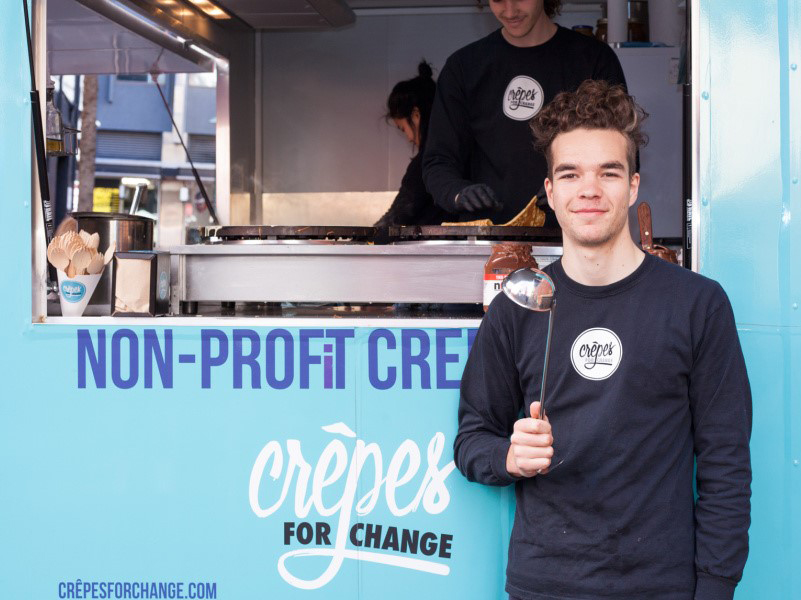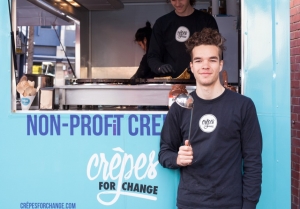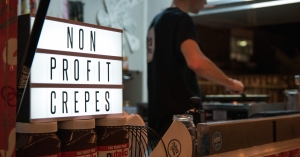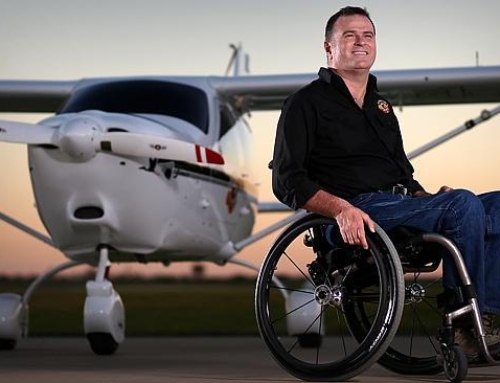When Dan Poole starts explaining how his idea for Crepes for Change first formed, the story parallels how author J.K. Rowling thought up the story of Harry Potter. Their respective ideas came whilst sitting on public transport, in Dan’s case on his way home from university, and by the time they reached their stops the ideas were fully formed. Scrolling through his phone Dan saw the statistic that over 100,000 Australians experience homelessness, approximately 46,000 of whom are twenty-five years old or younger. At the time, Dan and his brother Liam were working together at a French Creperie in Melbourne, so a mobile crepe stall seemed like the obvious way for them to make an impact:
“We are both interested in the foodie scene, and with pretty social-minded parents, we’ve always both had a social conscience, and growing up in St Kilda where there’s a big problem with homelessness turned me onto that issue from an early age”.
Dan and his brother Liam
Liam was quick to jump on board the project but pointed out the flaw in the plan: no money! Following in the footsteps of Melbourne-based social enterprises such as Streat, Feast of Merit and Inspirationary, who have greatly benefitted from successful crowd-funding campaigns, Dan and Liam set up a crowd-funding campaign through the website Chuffed in January 2015. They wildly exceeded their expectations by raising $12,055 to build their first crepe van. Dan maintains there is nothing particularly special about him or how he achieved success; it was more a case of ambition mixed with the right timing:
“I just realised that it was possible though your work or through your social enterprise to have a social element as part of what you do on a day-to-day basis. I think most people put it in the ‘too hard’ category and don’t really think of it as a possible thing that they can do. I just saw the opportunity, I was still young, still living at home at the time so there was no real risk involved from my end. I just saw that there was a huge potential to have a big impact in people’s lives so I went for it.”
After realising that they would surpass their fundraising target by quite some way, Dan, a twenty-three year old law student, took a semester off university to work full-time in a cafe to raise the extra funds needed to launch Crepes for Change.
Dan and his brother work well as a team, with different strengths:
“Liam takes charge of the actual van operations and the events. I’m in charge of the organisational side of things, running and growing the business.”
A call-out for volunteers on the Crepes for Change Facebook page was a pivotal moment in the social enterprise’s history:
“The two people who got back to me – Tenille Gilbert and Natalie Klenner – are still on the team now, almost a year and a half later and honestly we couldn’t have been in the same place as we are now without them. All of our team members were indispensable in getting us to where we are today.”
From there the successes rolled on. In August 2015, Crepes for Change held its first public event. In October of that year, the venture was awarded a $30,000 Flying Start grant from JetStar. Then, after hearing Dan speak at an event, Business Development Manager of YGAP Spark Patrick O’Callaghan encouraged him to apply for the Spark Australia Accelerator Program, suggesting it could assist with developing a strategy to expand the impact of Crepes for Change. The program, Dan says, was one of the most important experiences in his entrepreneurial journey:
“We got to meet these other social entrepreneurs in the game, like Maddie and like Lyndon. Previous to that, I didn’t know that many social entrepreneurs, I thought I was in this small bubble where I was the youngest one in it. Then I realised there were other people my age doing similar things, and that is really important – to have a network of people you can bounce ideas off, learn from, and help teach.”
Dan also cites co-founder of Mr. Burger, Myles Munro, as a valuable mentor:
“I meet up with him and bounce ideas off him, he’s a world class entrepreneur, I really respect him a lot”.
In their first year of operation Crepes for Change attended 155 events, half of which were public events such as festivals, night markets and corporate gatherings. The remaining events were private weddings and birthdays for which the team was invited to cater. Sales in the inaugural year equalled 16,000 crepes and as of May 2016, the enterprise had raised $100,000 in revenue.
Dan is proud that at the core of their business is a good product:
“We operate just like any other business, you’ll see us alongside any other commercial food truck.A lot of people when they’re buying our crepes probably won’t even realise we’re a non-profit which is what I like about it. It’s a good business in its own right, people aren’t just buying our crepes because we’re a non-profit.”
The organisation has now grown to accommodate over forty volunteers and five paid employees. Some people work solely in the van, some are on the executive team. They can now boast a full marketing team, sponsorship team and grants team.
The difficulty with the classification of a social enterprise is that the organisation exists in the space between business and charity:
“You find that you’re not eligible for some of the grants because you’re actually generating money from the service, even if the money’s going towards a social cause. You’re also a non-profit because there’s no money to gain at the end of it, so investors wouldn’t be interested.”
The government could assist ventures such as Crepes for Change by re-investing more into social enterprises:
“Not to say that charities without a funding arm like that aren’t doing great work, but I think you can have an exponential impact by investing in social enterprises. The money that you put in to social enterprises to allow them to get started will turn into so much more money down the track once they start business operations, and that will in turn create assets that will contribute to the cause for a long while. There are some grants run by government around, but there’s definitely not many, and there’s so many great ideas floating around. I constantly get ideas from people asking to run their social enterprise idea by me, but there’s this on-going problem of not being able to find enough money to get it started.”
However, not receiving government funds also has an upside – the business operations of Crepes for Change are not restricted by the rules or conditions that come along with receiving such money:
“We just go out there, make as much money as we can and then reinvest that into programs we believe have a lasting impact. That allows us to rely on the research and let that be the indicator of how we spend our money.”
What happens with the money made from the sale of these crepes?
“Nobody technically owns the company…all our profits go into programs that we’ve identified will be able to, in some way, alleviate instances of youth homelessness. We wanted to identify an organisation that we thought was really good, really efficient with their money and then give most of our profits to them.”
What would Dan like people to know about youth homelessness?
“Nobody chooses homelessness and nobody can be blamed for the situations that they’re in, especially these young people, who are definitely just products of their environment. The family you were lucky enough to be born into and the value they place on education is so important. I think that we have an obligation to help those who weren’t so lucky or who have run into obstacles along the way (such as mental illness), and give them an opportunity to improve their situation.”
With so many people working to reduce homelessness, why are so many of our young people still suffering?
“The money isn’t being put into what actually works, following a research-based approach. Some of the things that do work, such as putting these people into housing, is politically unpopular or too expensive so that creates a really interesting space for social enterprises, like us and HoMie.”
Wanting to support programs which have a proven track record of reducing homelessness, in August this year, Crepes for Change set up a partnership with Launch Housing, an organisation which provides housing and support services to Victoria’s homeless population:
“They don’t charge any service fee for doing it, so that means every dollar that we give them will go straight into the impact”.
To jumpstart this partnership Crepes for Change donated $20,000 to the Education First Youth Foyers (EYFY) initiative. Each EYFY location provides a home for forty people between 16 and 24 years old for two years. They are encouraged to work or study and after these two years, when the young person leaves to live independently, Crepes for Change is committed to subsidising their rent for the first year, gradually contributing less and less money until the young people is in full control of paying their rent. That is, for the first four months, Crepes for Change contributes 60% rent, in the fifth to eight month 40% rent, and in the ninth to eleventh month 20% rent.
This housing subsidy model aligns perfectly with Dan’s business principle of helping people help themselves:
“People need to feel empowered. We’re here to help people and create opportunities for training and employment. I think people will be resilient enough to bounce back and to help themselves.”
The team is implementing a Pay It Forward program so that people can visit the van, pay for additional crepes and then the team visits the Launch Housing venues and cook the crepes that had already been paid for for all the young people there.
In September this year, Crepes for Change launched their second social enterprise of the fleet, ‘The Coffee Cart Changing Lives’, co-founded by Dan Poole and Natalie Klenner:
“We’ve got some big plans to roll out semi-permanent carts in high-volume areas and actually employ disadvantaged young people to work in them. The idea is that they will be super scale-able and once we get the model right, we can replicate it in different places and maybe even different cities because it might not even require us to be there.”
Indeed, Dan is happy for the organisation to prosper without him at the helm:
“Once we’ve got a product and a brand that works really well, we could even go to youth homelessness based charities in cities around Australia and say “This is what we’ve built, here’s how you can implement it and use it as a fundraising arm.”
Like a true social entrepreneur, his skill set lies in the start-up scene:
“I like starting new businesses, getting them off the ground rather than running organisations so I don’t anticipate in the long-term, I’ll be running Crepes for Change, but I’ll always be involved in some way. It still is my main job, but I only ever made money when I was working in the van. I’ve saved up enough over the years. The reason I’m doing it now is that i really enjoy being in the van but I’m trying to focus more on growing the organisation and when I’m doing that, I’m just a volunteer…I want to start up other social enterprises so I can expand my reach my reach and help more people.”
Dan hopes to be able to combine his passion for law and social enterprise into a future project. He offers these comforting words to up-and-coming social entrepreneurs:
“It’s a lot of new ground to cover, and we have had to learn as we go…every new business is touch and go.l definitely didn’t know what I was doing 100% of the time, i was just following my heart.”
His advice is to be strategic about your business plan, making sure that you:
- Assemble a passionate and talented team
- Have established a safety net just in case you don’t experience success
- Apply for grants before building your business
- Come to terms with the prospect of failure – ‘businesses don’t always work and that’s OK’
- Prepare for hard work and long hours.
- Find several trusted mentors.
Most importantly Dan says go for it:
“If you are passionate about something- you only have one life time so you may as well go out there and give it your best – make it happen”.
Dan is enjoying working with Crepes for Change now more than ever and is hugely excited for the future:
“There is huge scope within our business model to change the organisation and push it in whatever way we want”.
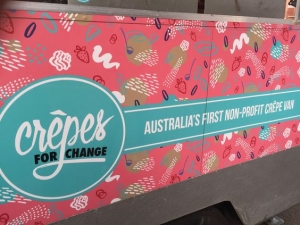
The Crepes for Change van visits Welcome to Thornbury a couple of times per month. Over the summer, it can be found at the Coburg Night Market, South Melbourne Night Market and the St Kilda festival. For more information about Crepes for Change, or to find out at which event it will next be stationed, please visit their website or Facebook page

